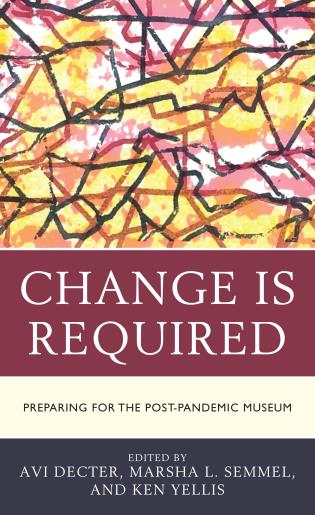The recently released publication, Change Is Required; Preparing for the Post-Pandemic Museum, is a culmination of essays by leading museum professionals as the entire field begins to adapt and change to cultural and professional realignment over the last two years. Some of the questions the book’s essayists ponder include:

Can we break through traditional hierarchies to change our decision-making processes?
Do we need to consider new shapes and structures for our organizations?
How can we reform and update our hiring and advancement practices to support the needs of our people–and the sustainability of our institutions?
Like many other organizations, the COVID-19 pandemic challenged American museums to rethink old assumptions and examine outdated models. The book gives examples of 50 American museums that have set new visions for themselves and their communities. Some examples featured in the essays include museums that have taken a decisive turn to digital programming and others that have changed focus toward community and developing new collaborations with their neighbors and local audiences. In addition, many essays featured stories of museums that have moved equity and justice to the core of their mission.
What I like most about this book is that it is an invitation to join in the growing, lively discourse about possible futures for museums in America. This collection of essays resonated with me because it emphasized the urgency to rethink traditional museum practice, offerings, and conventional narratives about what museums are and how they serve our communities. These conversions are not new, but the reach and the volume are substantial and louder than ever. If you think you can ignore these conversations and wait to return to a “new normal,” you are wrong. We can’t strive for a new normal, just as we can’t hope for a return to pre-COVID-19 “normal.” As Leo Ji put it, “[normal] suggests there is some collective sense of normalcy and connotes a value system where deviance from the standard is somehow unsavory or intolerable.” Museums of all types need to reckon with their colonializing roots and implode old models for brand-new ones that center around the people in our communities.
Why Is Change Required For Me?
Where does training and staff development come into this? I want to work with museums eager to make these radical changes, and a big part of this should be thinking about how you hire and retrain their staff. Training is the heart of retention. Investing in your staff’s learning and development makes them feel cared for; it reduces burnout. My greatest desire is to work to support museums that are doing this work. Please reach out to me to explore ways I can help you do this work because “Change Is Required.”
Want to know more about Empowered Development Consulting? Reach out to me, Meghan Schiedel, and find out how Empowered Development Consulting can help you.
